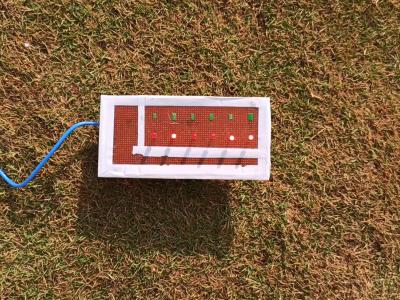Artificial Intelligence
The LEDNet dataset consists of image data of a field area that are captured from a mobile phone camera.
Images in the dataset contain the information of an area where a PCB board is placed, containing 6 LEDs. Each state of the LEDs on the PCB board represents a binary number, with the ON state corresponding to binary 1 and the OFF state corresponding to binary 0. All the LEDs placed in sequence represent a binary sequence or encoding of an analog value.
- Categories:
 688 Views
688 Views
Crowds express emotions as a collective individual, which is evident from the sounds that a crowd produces in particular events, e.g., collective booing, laughing or cheering in sports matches, movies, theaters, concerts, political demonstrations, and riots. Crowd sounds can be characterized by frequency-amplitude features, using analysis techniques similar to those applied on individual voices, where deep learning classification is applied to spectrogram images derived by sound transformations.
- Categories:
 1296 Views
1296 ViewsThe dataset is collected for the purpose of investigating how brainwave signals can be used to industrial insider threat detection. The dataset was connected using Emotiv Insight 5 channels device. The dataset contains data from 17 subjects who accepted to participate in this data collection.
- Categories:
 2219 Views
2219 ViewsThis dataset is in support of my research paper 'Comparison of ElectroMagnetic Emissions & Harmonic Analysis of 20 HP Motor Controlled by 3L NPC Inverter'.
Preprint : https://doi.org/10.36227/techrxiv.19687041.v1
This is useful for manufacturers and r&d engineers for product costing. For more information, results, conclusions on this, pls read research paper.
- Categories:
 4177 Views
4177 ViewsThis dataset is part of my Master's research on malware detection and classification using the XGBoost library on Nvidia GPU. The dataset is a collection of 1.55 million of 1000 API import features extract from jsonl format of the EMBER dataset 2017 v2 and 2018. All data is pre-processing, duplicated records are removed. The dataset contains 800,000 malware and 750,000 "goodware" samples.
- Categories:
 16229 Views
16229 ViewsThe early detection of damaged (partially broken) outdoor insulators in primary distribution systems is of paramount importance for continuous electricity supply and public safety. In this dataset, we present different images and videos for computer vision-based research. The dataset comprises images and videos taken from different sources such as a Drone, a DSLR camera, and a mobile phone camera.
- Categories:
 1733 Views
1733 ViewsThis dataset is released with our research paper titled “Scene-graph Augmented Data-driven Risk Assessment of Autonomous Vehicle Decisions” (https://arxiv.org/abs/2009.06435). In this paper, we propose a novel data-driven approach that uses scene-graphs as intermediate representations for modeling the subjective risk of driving maneuvers. Our approach includes a Multi-Relation Graph Convolution Network, a Long-Short Term Memory Network, and attention layers.
- Categories:
 3036 Views
3036 ViewsAs an alternative to classical cryptography, Physical Layer Security (PhySec) provides primitives to achieve fundamental security goals like confidentiality, authentication or key derivation. Through its origins in the field of information theory, these primitives are rigorously analysed and their information theoretic security is proven. Nevertheless, the practical realizations of the different approaches do take certain assumptions about the physical world as granted.
- Categories:
 1494 Views
1494 ViewsThe Magnetic Resonance – Computed Tomography (MR-CT) Jordan University Hospital (JUH) dataset has been collected after receiving Institutional Review Board (IRB) approval of the hospital and consent forms have been obtained from all patients. All procedures followed are consistent with the ethics of handling patients’ data.
- Categories:
 2609 Views
2609 ViewsThe Magnetic Resonance – Computed Tomography (MR-CT) Jordan University Hospital (JUH) dataset has been collected after receiving Institutional Review Board (IRB) approval of the hospital and consent forms have been obtained from all patients. All procedures followed are consistent with the ethics of handling patients’ data.
- Categories:
 1699 Views
1699 Views




